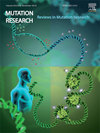投稿信息
稿件收录要求
Mutation Research (MR) provides a platform for publishing all aspects of DNA mutations and epimutations, from basic evolutionary aspects to translational applications in genetic and epigenetic diagnostics and therapy. Mutations are defined as all possible alterations in DNA sequence and sequence organization, from point mutations to genome structural variation, chromosomal aberrations and aneuploidy. Epimutations are defined as alterations in the epigenome, i.e., changes in DNA methylation, histone modification and small regulatory RNAs.
MR publishes articles in the following areas:
- Of special interest are basic mechanisms through which DNA damage and mutations impact development and differentiation, stem cell biology and cell fate in general, including various forms of cell death and cellular senescence.
- The study of genome instability in human molecular epidemiology and in relation to complex phenotypes, such as human disease, is considered a growing area of importance.
- Mechanisms of (epi)mutation induction, for example, during DNA repair, replication or recombination; novel methods of (epi)mutation detection, with a focus on ultra-high-throughput sequencing.
- Landscape of somatic mutations and epimutations in cancer and aging.
- Role of de novo mutations in human disease and aging; mutations in population genomics.
- Interactions between mutations and epimutations.
- The role of epimutations in chromatin structure and function.
- Mitochondrial DNA mutations and their consequences in terms of human disease and aging.
- Novel ways to generate mutations and epimutations in cell lines and animal models.
MR supports and follows the general direction proposed by all major societies in the field part of the International Association of Environmental Mutagenesis and Genomics Societies (IAEMGS):
- Asociacion Latinoamericana de Mutagenesis, Carcinogenesis y Teratogenesis Ambiental (ALAMCTA)
- Brazilian Association of Mutagenesis and Environmental Genomics (MutaGen-Brasil)
- Chinese Environmental Mutagen Society (CEMS)
- European Environmental Mutagenesis and Genomics Society (EEMGS)
- Environmental Mutagenesis and Genomics Society (EMGS)
- Environmental Mutagen Society of India (EMS India)
- Iranian Environmental Mutagen Society (IrEMS)
- The Japanese Environmental Mutagen Society (JEMS)
- Korean Environmental Mutagen Society (KEMS)
- Molecular and Experimental Pathology Society of Australasia (MEPSA)
- Pan-African Environmental Mutagen Society (PAEMS)
- Philippines Environmental Mutagen Society (PEMS)
- Thai Environmental Mutagen Society (TEMS)




